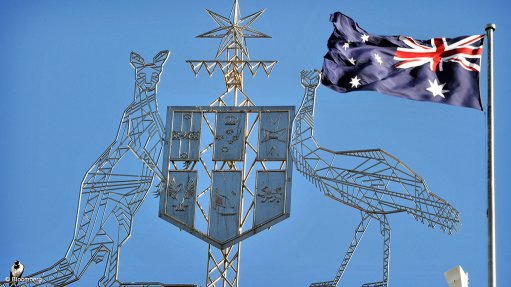
Photo by: Bloomberg
PERTH (miningweekly.com) – The Australian resources sector has welcomed the federal government’s 2016/17 Budget, which saw Treasurer Scott Morrison assigning A$100-million to Geoscience Australia to boost the productivity and competitiveness of the minerals sector.
Resources and Energy Minister Josh Frydenberg said the A$100-million in new funding was in addition to the A$1.1-billion of initiatives outlined in the government’s National Innovation and Science Agenda.
“The A$100-million Exploring for the Future programme will produce precompetitive geoscience data, to be released on a yearly basis over the next four years.
“Geoscience Australia estimates that around 80% of Australia remains under-explored, in particular, areas in the Northern Territory, Queensland, Western Australia and South Australia, which will be the focus of this initiative. This will improve Australia’s long-term exploration prospects and help address declining new onshore exploration.”
Frydenberg said the benefits of this were clear, pointing to the 1996 decision by Geoscience Australia to undertake A$3-million of analysis in the Browse basin that helped identify the Ichthys field, which would produce more than A$70-billion in export earnings over the next 40 years.
“Further, data compiled across South Australia in the 1960s, costing around A$350 000, helped identify the resource potential of the Olympic Dam [mine] and ultimately led to the discovery of ore more than 300 m underground.
“At a challenging time for the resources sector, this important initiative will help ensure that Australia’s strength in innovation is furthered, and that we maintain our competitive edge in this world-leading sector.”
The Association of Mining and Exploration Companies (Amec) welcomed the A$100-million investment into exploration, with national policy manager Graham Short saying that exploration geoscience had to be central to the nation’s innovation agenda.
“Australia has a competitive advantage in resource development and must seize the opportunity for science and innovation, together with vital new capital investment in exploration, to improve discovery rates in Australia.”
He added that, to complement the additional geoscience funding, Amec would like to see a long-term roll-over and additional yearly commitment to the Exploration Development Incentive (EDI) in the Forward Estimates in order to stimulate investment in eligible Australian junior mineral exploration companies that would provide shareholders with a tax offset equivalent to the company tax rate.
“The production of precompetitive data by Geoscience Australia, the state and territory geological surveys and the EDI are inextricably linked if we are to improve exploration outcomes and provide new mines for future generations.
“These strategies are also vitally important, [given] that a number of large producing mines are coming to an end and not being replaced at a fast enough rate.”
Short noted that new mines would create thousands of jobs and generate significant economic and social dividends for the nation and local communities.
“The government should also consider its role in unlocking resource projects that are ‘stranded’ due to the lack of cost-effective infrastructure, approval delays or access to finance. These need to be facilitated or fast-tracked where possible.
“The government’s A$50-billion infrastructure development plan to 2019/20 is a great investment for growth and jobs but it mainly focuses on capital cities rather than critical economic producing regional infrastructure, which could release stranded mineral projects and generate revenue streams for the nation, and regional communities.”
The resources sector, meanwhile, also welcomed the lowering of the company tax rate over the medium term, which was expected to improve Australia’s competitiveness and promote job creation and investment.
“The enterprise tax plan to reduce the corporate tax to 25% for all Australian resident companies by 2026/27 is a significant step in the right direction, but needs to be implemented sooner to be a clear incentive for job creation and an economic boost throughout the nation,” Short said.
Frydenberg on Wednesday pointed out that the resources sector continued to play an important role in the economy and contributed about 10% of Australia’s gross domestic product and more than 50% of the country’s exports.
Australian Petroleum Production & Exploration Association (Appea) CEO Dr Malcolm Roberts said the Budget acknowledged the significant contribution made by the growing oil and gas sector, despite the challenging market environment.
“The oil and gas industry is completing an unprecedented A$200-billion of investment. The industry is already generating A$17-billion in exports, paying billions of dollars in government revenues and creating and supporting thousands of jobs. By 2019, Australia will be the world’s largest liquefied natural gas exporter.”
Roberts noted that as many of these projects began operation, this investment would continue to underpin Australia’s economic performance and provide benefits to Australia for many decades to come.
“The challenging conditions facing the industry, both globally and in Australia, mean it is more important than ever to ensure the policy and regulatory framework facing the oil and gas industry in Australia remains competitive and encourages further exploration and development activity.
“Capturing future growth and investment opportunities, and leveraging investments to support future industry service sector growth, must be a key feature of the policies of the major parties for the imminent federal election.”